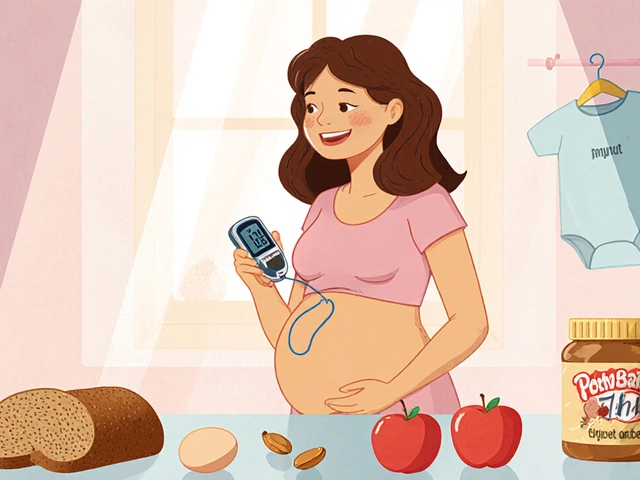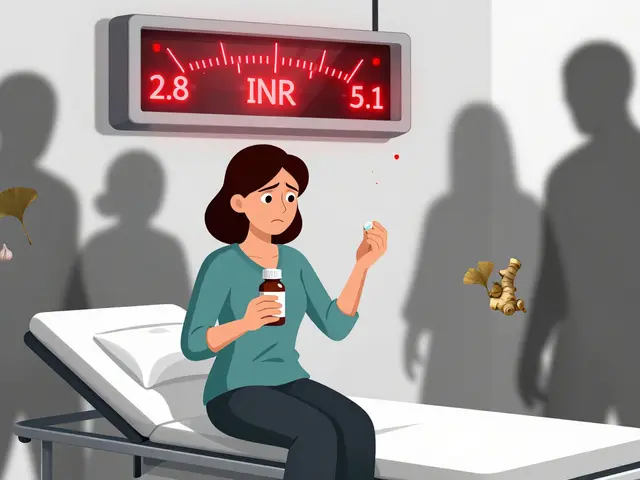Family Worm Infection Risk Checker
Quick Takeaways
- Wash hands with soap for at least 20 seconds after bathroom use and before meals.
- Keep nails trimmed and clean; kids love to dig in the dirt.
- Wear shoes outdoors and avoid bare‑foot play on soil that may be contaminated.
- Wash all fruits and vegetables thoroughly; cook meat to safe temperatures.
- Schedule routine stool tests and deworming medication for children, especially in high‑risk areas.
Understanding Worm Infections
Worm infections is a group of intestinal parasitic diseases caused by helminths that live in the human gut, often acquired through contaminated soil, food, or poor hygiene. The most common culprits in households are roundworm, hookworm, pinworm and, less frequently, tapeworm. While many infections are mild, heavy loads can lead to anemia, growth delays in children, and chronic abdominal discomfort.
Common Types and Their Risks
| Worm | Typical Transmission | Key Symptoms | Standard Treatment |
|---|---|---|---|
| Roundworm | Ingesting eggs from contaminated soil or raw vegetables | Mild abdominal pain, coughing, occasional skin rash | Albendazole 400mg single dose |
| Hookworm | Larvae penetrate bare feet; eggs in contaminated soil | Iron‑deficiency anemia, itching at entry sites | Mebendazole 100mg twice daily for 3days |
| Pinworm | Fecal‑oral spread; scratching perianal area transfers eggs | Itchy night‑time anus, disturbed sleep | Pyrantel pamoate 11mg/kg single dose, repeat in 2weeks |
| Tapeworm | Eating undercooked beef, pork or fish containing cysts | Weight loss, visible segments in stool | Praziquantel 5-10mg/kg single dose |
Break the Transmission Cycle
The easiest way to keep worms out is to disrupt how they move from the environment to the gut. Handwashing with soap for at least 20seconds after bathroom use, after playing outdoors, and before every meal removes eggs that cling to skin. Pair this with nail trimming - short nails are harder for kids to hide parasite particles under.
Food safety plays a big role. Rinse raw fruits and vegetables under running water and, when possible, use a brush for produce with rough skins. Cook meat to internal temperatures of 71°C (160°F) for pork and beef, and 63°C (145°F) for fish, ensuring any cysts in tapeworm are destroyed.

Safe Play & Outdoor Practices
Children love to dig, but soil can be a reservoir for hookworm larvae. Encourage wearing sturdy shoes or sandals when playing in gardens, parks, or sandpits. If barefoot play is unavoidable, wash feet with soap and water as soon as they come indoors.
Pets can inadvertently spread worm eggs, especially if they roam outdoors. Keep cats and dogs on a regular deworming schedule and avoid letting them defecate in areas where children play. Clean up pet waste promptly and wash your hands afterward.
Regular Screening & Deworming
Even with perfect hygiene, occasional exposure happens. Annual stool tests for children, or sooner if symptoms appear, catch infections early. In many countries, guidelines recommend a single dose of deworming medication for all school‑aged kids every six months, especially in regions where soil‑transmitted helminths are common.
When doctors prescribe medication, follow the dosage exactly and repeat the dose after two weeks if dealing with pinworm, because re‑infection from lingering eggs is common.
Creating a Worm‑Free Home
Sanitation is the backbone of prevention. Clean kitchen surfaces with a diluted bleach solution (1tbsp bleach per litre of water) after handling raw meat. Disinfect bathroom fixtures weekly to kill any stray eggs.
Launder bedding, towels, and children's clothing in hot water (≥60°C) at least once a week. This eliminates eggs that may have clung to fabric during night‑time itching episodes caused by pinworm.
Maintain a tidy yard: remove animal feces promptly, rake away leaf litter, and keep grass trimmed. A well‑maintained garden reduces the chance of soil remaining moist enough for worm larvae to survive.
Checklist for Families
- Wash hands with soap for 20seconds after bathroom, before meals, and after outdoor play.
- Trim nails weekly; keep them short.
- Wear shoes outside; avoid barefoot contact with soil.
- Rinse all fresh produce; cook meat to safe temperatures.
- Schedule stool testing for kids at least once a year.
- Administer deworming meds per pediatrician’s advice, typically every 6months.
- Clean kitchen surfaces with bleach solution; disinfect bathroom weekly.
- Launder bedding and towels in hot water weekly.
- Keep pet waste removed promptly; deworm pets regularly.
- Maintain a tidy yard - mow grass, remove feces, and keep soil dry.
Related Topics to Explore
After securing your home, you might want to read about nutritional boosts for children recovering from parasitic infections, the impact of water sanitation programs in rural communities, and how school deworming campaigns are evaluated for effectiveness.

Frequently Asked Questions
How often should my family be dewormed?
In areas where soil‑transmitted helminths are common, a single dose of albendazole or mebendazole for all children aged 2‑12years every six months is the standard recommendation. Adults who share the same environment can follow the same schedule or be treated as needed based on stool test results.
Can adults get pinworm infections?
Yes, adults can contract pinworms, especially if they share close living spaces with infected children. Symptoms are often milder, but the same medication (pyrantel pamoate) and hygiene measures apply.
What are the signs that a child might have a worm infection?
Look for persistent itchy anus, especially at night, unexplained weight loss, abdominal discomfort, or visible worms in stool. Blood tests may reveal anemia in cases of heavy hookworm infection.
Is it safe to use bleach on kitchen surfaces?
A diluted bleach solution (1tbsp per litre of water) is effective at killing worm eggs and safe for most surfaces when rinsed after a few minutes. Always ventilate the area and keep children away while cleaning.
Do pets carry the same worms as humans?
Pets can host some of the same species, such as roundworm (Toxocara) and hookworm. Regular veterinary deworming and preventing pets from defecating in play areas drastically reduce cross‑contamination risk.
Can washing fruits with soap remove worm eggs?
No, soap residues can be harmful if ingested. A thorough rinse under running water, sometimes with a brush, is sufficient. For higher risk produce, a short soak in a vinegar‑water solution (1:3) helps dislodge stubborn eggs.
What should I do if I suspect my child has a worm infection?
Consult a pediatrician for a stool examination. While awaiting results, practice intensified hygiene-handwashing after bathroom use, daily nail trimming, and cleaning the household linens in hot water. If prescribed, follow the medication schedule precisely.






Justina Maynard
24 September, 2025 . 18:34 PM
My kids used to dig in the backyard like it was a treasure hunt-until I found a pinworm egg under their thumbnail. Now? Nails are clipped weekly, shoes on at all times, and we wash hands like we’re prepping for surgery. It’s insane how one tiny parasite can turn your whole household into a hygiene cult. But honestly? Worth it.
Evelyn Salazar Garcia
25 September, 2025 . 17:12 PM
Why are we even talking about this? We’re not some third-world village. Just don’t let your kids eat dirt.
Clay Johnson
27 September, 2025 . 14:48 PM
Worms are nature’s way of reminding us that control is an illusion. We scrub, we disinfect, we medicate-but the soil remembers. The real question isn’t how to kill them. It’s whether we should be trying to live with them at all.
Jermaine Jordan
29 September, 2025 . 01:34 AM
This isn’t just advice-it’s a revolution in family health. Every handwash is a shield. Every trimmed nail, a victory. Every dose of albendazole, a declaration that we refuse to let parasites steal our children’s potential. This is how we win.
Chetan Chauhan
1 October, 2025 . 00:04 AM
you mean we gotta wash fruits with water? lol i thought soap was better. also why are we using bleach? isnt that toxic? my grandma just used lemon juice and called it a day
Phil Thornton
1 October, 2025 . 13:40 PM
My wife swears by vinegar soaks. I don’t know if it works, but she’s way calmer now.
Pranab Daulagupu
3 October, 2025 . 02:08 AM
Helminthic therapy is under-researched. There’s emerging data suggesting controlled exposure may modulate immune responses. Not saying we shouldn’t prevent, but maybe we’re over-cleaning.
jobin joshua
3 October, 2025 . 11:45 AM
My dog poops in the yard and I just laugh 😆 worms are just part of life bro. Chill.
Sachin Agnihotri
4 October, 2025 . 14:52 PM
So, let me get this straight-we’re supposed to bleach the kitchen, wash everything in hot water, and give kids meds every six months? That’s a full-time job. And I thought parenting was hard already.
Diana Askew
4 October, 2025 . 23:16 PM
They’re lying. This is all a Big Pharma ploy. The real cause is 5G towers and fluoridated water. My cousin’s kid got worms after the school got new smartboards. Coincidence? I think not.
King Property
5 October, 2025 . 23:05 PM
You people are clueless. Albendazole is outdated. You need a combination of ivermectin and mebendazole with a probiotic protocol. And you’re not washing your hands right-you’re using soap, not antimicrobial gel. Pathetic.
Yash Hemrajani
7 October, 2025 . 11:03 AM
Oh wow, bleach on kitchen counters? That’s cute. You do know worm eggs survive bleach for hours? Try boiling water first, then bleach. And don’t forget to scrub with a toothbrush. You’re doing it wrong.
Pawittar Singh
9 October, 2025 . 09:42 AM
Hey, if you’re doing this right, you’re not just protecting your family-you’re lifting up your whole community. One clean yard, one handwash, one dose at a time. We got this 💪
Josh Evans
10 October, 2025 . 03:32 AM
I’ve been doing all this for years. My kids haven’t had worms since they were two. Just consistency. No magic.
Allison Reed
11 October, 2025 . 16:22 PM
Thank you for writing this. I’ve been terrified since my daughter started crawling. This checklist is everything I needed. I’m printing it and taping it to the fridge.
Jacob Keil
13 October, 2025 . 14:14 PM
Worms are just evolution’s way of selecting for strong immune systems. Stop medicating kids. Let nature take its course. You’re creating a generation of fragile humans.
Rosy Wilkens
15 October, 2025 . 02:31 AM
They’re putting worm eggs in vaccines. That’s why they want you to wash your hands and take deworming meds-it’s a cover-up. The CDC knows. They’ve been hiding the truth since 2008.